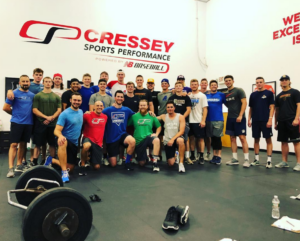
The #1 Cause of Inconsistent Pitching Velocity
As anyone who reads my posts regularly surely knows, I’ve devoted a significant portion of my life to figuring out how to make guys throw baseballs faster. However, my interest in velocity isn’t just limited to how to get to “X” miles per hour; it also extends to understanding how to stay (or improve upon) “X” miles per hour over the course of a single appearance, season, or career while staying healthy and developing the rest of one’s pitching arsenal. Erratic radar gun readings are as much a problem as insufficient radar gun readings.
My foremost observation on this front has been that velocity is much more erratic in high level teenagers than any other population. At Cressey Sports Performance, we’ve had loads of high school guys top the 90mph mark over the years, so we’ve built up a good sample size to consider. While some of these guys are quite consistent, I find that they tend to have more 4-6mph drop-offs here and there than any other population with which I’ve worked. A guy that is 90-94 on one day might come back at 86-88 five days later – seemingly out of the blue.
However, I don’t think it’s just a random occurrence. Rather, in my experience, EVERY single time it happens, it’s because he has let his body weight drop – usually due to being on the road for games and not packing enough food. We see it all the time in kids who throw great up in New England, but then head down South for tournaments. All of a sudden, they are living out of hotels and eating out of restaurants multiple times per day – which certainly isn’t going to be as conducive to maintaining body weight as “grazing” around the house and chowing down on Mom’s home-cooking multiple times per day. To make matters worse, a lot of kids lose their appetites when they get out in the heat – and not many people from across the country are prepared for the weather in Georgia or South Carolina in July. So, insufficient caloric intake becomes completely inadequate caloric intake – and that’s not exactly a recipe for throwing the baseball faster.

Beyond just the body weight factor, though, you also have to look at the fact that the advanced teenage pitchers are generally also the best athletes – so their coaches almost always have them out in the outfield or at SS/3B when they aren’t pitching. Playing a position interferes with a solid throwing program and just doesn’t give a kid a chance to rest. There are more calories burned, too!
What’s interesting, though, is that kids who don’t throw as hard – say, 70-82 – never have variability in their velocity readings; they are super consistent. Why? Well, for one, they usually aren’t quite good enough to get on travel teams and in competitive scenarios that would require them to have to consciously consider how to maintain their weight. Rather, it’s Mom’s home-cooking all the time – so it’s easier to maintain their weight. And, they may not be talented enough to be able to play other positions when they aren’t pitching.
This difference is really interesting because both populations – independent of strength and conditioning – are at ages where their bodies are changing and (presumably) getting heavier naturally as they go through puberty and gain muscle mass.
This rarely applies to anyone who has pitched in the professional ranks for more than a year or two. You never see a professional pitcher go out and throw 5-7mph slower than normal unless he is hurt or coming back on very short rest. These guys have found their “set points,” and have learned over the years how to get in enough calories when on the road (out on their own means cooking for themselves, plus eating whatever their clubhouse dues gets them at the park). Plus, they aren’t playing the field.
All that said, regardless of your age, experience level, and current velocity, don’t skimp on calories. If you look at every bit of research on the pitching motion, body weight predicts pitching velocity. If you’re on the road, make sure you pack some shakes, trail mix, bars, fruit, nuts, jerky, or whatever other convenience food helps you to get in the calories you need to light up the radar gun. Also, 8 Nutritional Strategies for Those Who Can’t Gain Weight is one of my most popular articles of all time, if you’re looking for some succinct thoughts on the topic.
And, if you’re one of the pitchers who desparately needs to put on 15-20 pounds to make a big jump in velocity this summer, then the CSP Collegiate Elite Baseball Development Program is for you. For more information on this 10-week program, click here.



